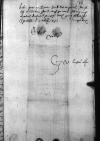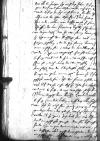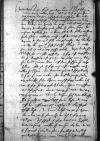Hochwirdiger in Got furst, genediger herre. / Nach erbittung meiner gantz willigen dinst /
gib ich Ewer Furstlichen Gnaden zuerkhennen, das meines langen auspleibendens schreiben kain andere, alleine diesze ursach ist. / Nach wegzihung meines lieben hern bruders hern Cornelis von ⌊Prag⌋ / hab ich wil gewust, das uns der almechtig palt sollen zu samen fugen, / sein auch von derselbigen zeit / in keiner pleibenden stellen vorharret, sonder statz in ublicher raisze / auff dem wege gewest, / das wir die stat und stelle erlangen mochten, / des ⌊romischer kayserlicher⌋ mit ⌊romischer koniglicher maiesteten⌋ hoff sich sehn solleten. / In mittler zeit / hab ich vil guttes geschir gehabt. / Unser bruder her ⌊Nibschiz⌋ hat mir offt geschriben, / Ewer Furstliche Gnade nicht vergessen. / Bin zu ⌊Augspurg⌋ acht gantzer tage geligen meinem lieben hern bruder ⌊Cunrat Mair⌋ / auff seiner hochzeit zu wolgefallen. / Aldo ist Ewer Furstliche Gnade auch nicht vorgessen worden. Alhie zu ⌊Speier⌋, / her ⌊doctor Wenzel⌋ und ich gedengken Ewer Furstlichen Gnaden zu merren malen, / sein auch die gantze stadt aus gelauffen, / haben kheinen mensch fragen wollen, / bisz wir Ewer Furstlichen Gnaden herbirg gefunden haben. / Ist an einem schonen und lustigen ort, / aber ein wenig zu weit / von uns. / Vorzeitten war ein thumher dorinne, hisz doctor Ribeischen, hab in gekhant von wegen seiner rohei, / die was auff dem nechstvorgangenen ⌊reichstag⌋ / die allerschonste pfaffen rithei. / In summa, hilfft uns Got zu ⌊Speier⌋ / aber anders wo zu samen, szo bin ich Ewer Furstlichen Gnaden gantz und gar. / Ich schick Ewer Furstlichen Durchlaucht hiemit ein epistel ⌊doctor Vrsinus⌋, / wellet sy von ime als dem, / der von Ewer Furstlichen Gnaden wil commendirt sein, / freuntlich und erstlich genediglich annemen. / Wan warlich, ich wollet gern, das alle die jenigen, szo mich liep haben, Ewer Furstlichen Gnaden auch gerne dineten und freuntlichen willen erzeigten. / Das wirdt Ewer Furstliche Gnade, der ich mich hiemit bevelhen thue, alzait mit der that befinden. / Newe zeittung khein ander, / allein, / wir hoffen unser zu samen khunfft. / Der her ⌊Hieronimus Laskii⌋ schreibt mi[r] vor dreisen tagen, / das her von seinen herren alh[ie] zu ⌊Spire⌋ auff denn ⌊reichstage⌋ sein wil / mit zweien gesellen, / die do peÿ seinen herren zu einem ansehen sein. / Was die handlung shein wirdt, / ist mir vorporgen, / zweifeln aber nicht, Ewer Furstliche Gnade werde mit der zeit, / wo es schon nicht bescheen ist, / auch etwus dor von wissen. / Ich hore sagen, das der ⌊Gerstorffer⌋ sollen shein von ⌊koniglicher maiestet von Polen⌋, meinen gnedigen herren, zu Ewer Furstlichen Gnaden geschigk worden sein. / Ist ein fromer ⌊gesell⌋, / m... wol leiden, das her nicht bisz zu diser zeit abgefurt... und mit Ewer Furstliche Gnaden, / do wir uns sehen solten konne[n]. Meinen liepsten hern bruder Cornelium wollet Ewer Furstliche Gnade comendirt haben / auff das aller hochste, wan ich bin auch sein gantz gros und vas... genediger herre. / Des gleichen vorsuch ich mich auch widderumb zu ime. / Ich hab ime aus ⌊Bohemen land⌋ ein geschengk pracht, / das fur ich auff d... stunden cum ea qua decet venerentia mit mir. / Ist ein trefflicher alter geschribener poeta, / den ze ... nie gesehen hat. / Etlich vorsten mag er villeicht ghe... haben quasi ex Ennio, / sonder das / original, / das ist biss in tertrain sporam / vorzaigt worden. / Sol uns auch, ab Gotwil, kurtzweil pringen.



